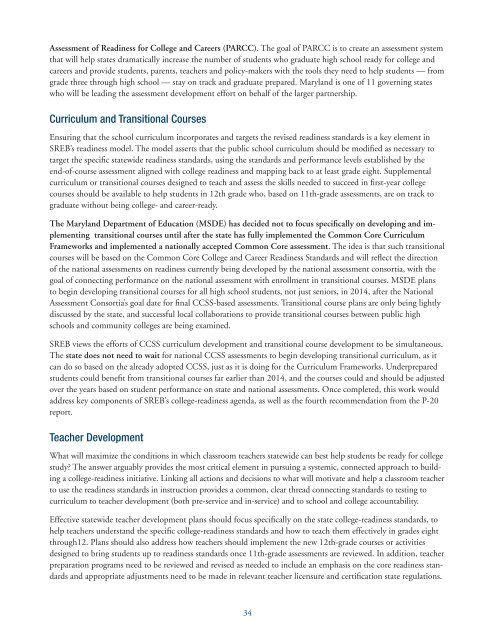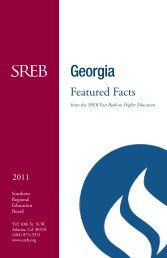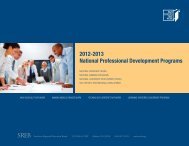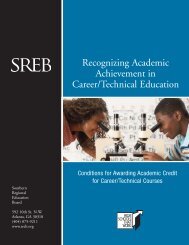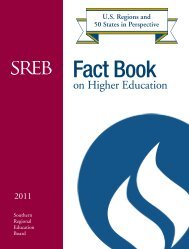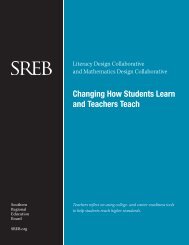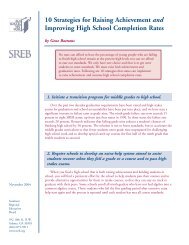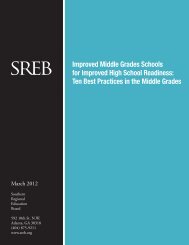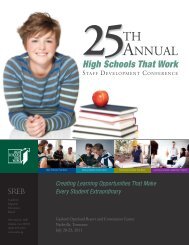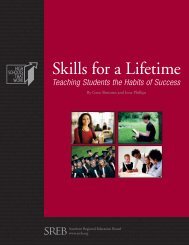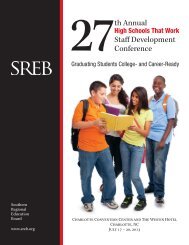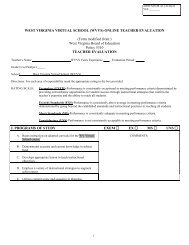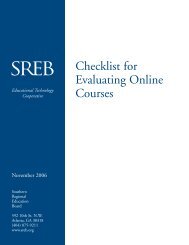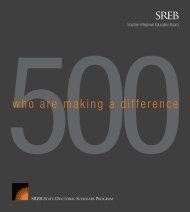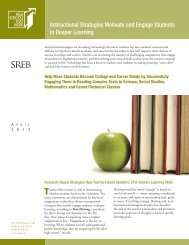Final Progress Reports - Southern Regional Education Board
Final Progress Reports - Southern Regional Education Board
Final Progress Reports - Southern Regional Education Board
Create successful ePaper yourself
Turn your PDF publications into a flip-book with our unique Google optimized e-Paper software.
Assessment of Readiness for College and Careers (PARCC). The goal of PARCC is to create an assessment system<br />
that will help states dramatically increase the number of students who graduate high school ready for college and<br />
careers and provide students, parents, teachers and policy-makers with the tools they need to help students — from<br />
grade three through high school — stay on track and graduate prepared. Maryland is one of 11 governing states<br />
who will be leading the assessment development effort on behalf of the larger partnership.<br />
Curriculum and Transitional Courses<br />
Ensuring that the school curriculum incorporates and targets the revised readiness standards is a key element in<br />
SREB’s readiness model. The model asserts that the public school curriculum should be modified as necessary to<br />
target the specific statewide readiness standards, using the standards and performance levels established by the<br />
end-of-course assessment aligned with college readiness and mapping back to at least grade eight. Supplemental<br />
curriculum or transitional courses designed to teach and assess the skills needed to succeed in first-year college<br />
courses should be available to help students in 12th grade who, based on 11th-grade assessments, are on track to<br />
graduate without being college- and career-ready.<br />
The Maryland Department of <strong>Education</strong> (MSDE) has decided not to focus specifically on developing and implementing<br />
transitional courses until after the state has fully implemented the Common Core Curriculum<br />
Frameworks and implemented a nationally accepted Common Core assessment. The idea is that such transitional<br />
courses will be based on the Common Core College and Career Readiness Standards and will reflect the direction<br />
of the national assessments on readiness currently being developed by the national assessment consortia, with the<br />
goal of connecting performance on the national assessment with enrollment in transitional courses. MSDE plans<br />
to begin developing transitional courses for all high school students, not just seniors, in 2014, after the National<br />
Assessment Consortia’s goal date for final CCSS-based assessments. Transitional course plans are only being lightly<br />
discussed by the state, and successful local collaborations to provide transitional courses between public high<br />
schools and community colleges are being examined.<br />
SREB views the efforts of CCSS curriculum development and transitional course development to be simultaneous.<br />
The state does not need to wait for national CCSS assessments to begin developing transitional curriculum, as it<br />
can do so based on the already adopted CCSS, just as it is doing for the Curriculum Frameworks. Underprepared<br />
students could benefit from transitional courses far earlier than 2014, and the courses could and should be adjusted<br />
over the years based on student performance on state and national assessments. Once completed, this work would<br />
address key components of SREB’s college-readiness agenda, as well as the fourth recommendation from the P-20<br />
report.<br />
Teacher Development<br />
What will maximize the conditions in which classroom teachers statewide can best help students be ready for college<br />
study The answer arguably provides the most critical element in pursuing a systemic, connected approach to building<br />
a college-readiness initiative. Linking all actions and decisions to what will motivate and help a classroom teacher<br />
to use the readiness standards in instruction provides a common, clear thread connecting standards to testing to<br />
curriculum to teacher development (both pre-service and in-service) and to school and college accountability.<br />
Effective statewide teacher development plans should focus specifically on the state college-readiness standards, to<br />
help teachers understand the specific college-readiness standards and how to teach them effectively in grades eight<br />
through12. Plans should also address how teachers should implement the new 12th-grade courses or activities<br />
designed to bring students up to readiness standards once 11th-grade assessments are reviewed. In addition, teacher<br />
preparation programs need to be reviewed and revised as needed to include an emphasis on the core readiness standards<br />
and appropriate adjustments need to be made in relevant teacher licensure and certification state regulations.<br />
34


